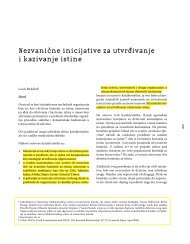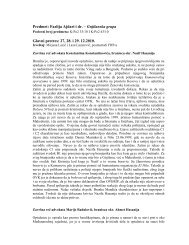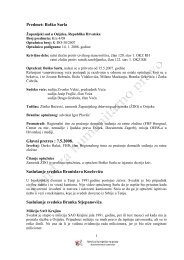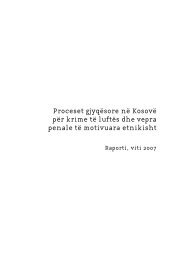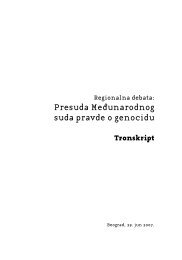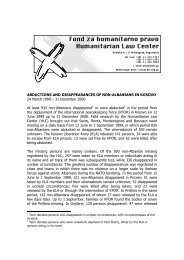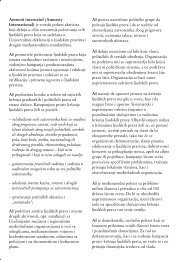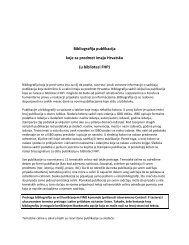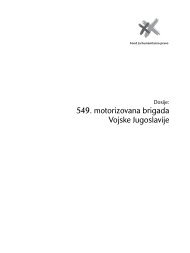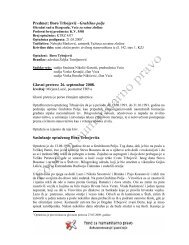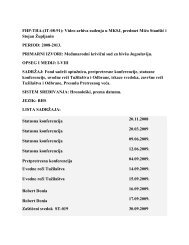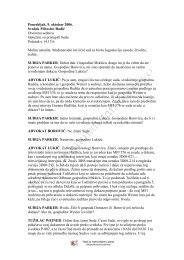here - Humanitarian Law Center/Fond za humanitarno pravo
here - Humanitarian Law Center/Fond za humanitarno pravo
here - Humanitarian Law Center/Fond za humanitarno pravo
You also want an ePaper? Increase the reach of your titles
YUMPU automatically turns print PDFs into web optimized ePapers that Google loves.
prosecution of organised crime, the same can not be said for the Office of the War Crimes<br />
Prosecutor.<br />
From its founding in 2003 to the present day, the Office of the War Crimes Prosecutor has<br />
shown readiness only to indict immediate perpetrators, and not mid-ranking and high-ranking<br />
Yugoslav People’s Army, Yugoslav Army and Ministry of the Interior of the Republic of Serbia<br />
(MUP) officials, who ordered crimes or whose subordinates committed crimes that they, as their<br />
superior officers, knew of.<br />
To date, the Office of the War Crimes Prosecutor has only indicted two low-ranking officers and<br />
one mid-ranking officer. 10 Lack of willingness on the part of the Office of the War Crimes<br />
Prosecutor to prosecute high-ranking members of the Yugoslav People’s Army, Yugoslav Army<br />
and MUP, despite the existence of clear evidence against them, and the continuing practice of<br />
bringing them to court only as witnesses, was particularly obvious in the Lovas case. For the first<br />
time since the beginning of processing of war crimes in Serbia, the Office of the War Crimes<br />
Prosecutor's practice was criticised by the trial panel handling this case. Explaining the reasoning<br />
behind the judgement reached on 26 June 2012, the presiding judge in the Lovas case stated that<br />
the panel found that the Second Proletarian Guard Mechanized Brigade of the Yugoslav People’s<br />
Army was to be held primarily responsible for the attack on Lovas and everything that had<br />
happened during the attack, adding that a valuable body of evidence had been presented during<br />
the trial, which “leaves open the possibility for the prosecutor to seek justice for family members<br />
of the victims, by bringing charges against individuals who were included in the original<br />
indictment, but left out of the amended indictment.” “We have heard in this courtroom”, the<br />
judge added, “the full names of some other actors involved in the critical events, some of them<br />
even appeared before us as witnesses, so the prosecutor should fulfil the promise he gave in his<br />
closing argument and look into their criminal responsibility as well, if we are to ensure fairness<br />
both to the victims and the accused.” She added that an important segment of the events in Lovas<br />
– Croatian civilians moving out of the area controlled by Yugoslav People’s Army – had been<br />
omitted from the indictment.<br />
So far, the Office of the War Crimes Prosecutor has brought no charges for command<br />
responsibility. However, in 2010 the trial chamber presided over by judge Tatjana Vuković,<br />
10<br />
The accused are as follows: 1) Miodrag Dimitrijević, appointed by the Sectoral HQ of Valjevo TO as<br />
coordinator of combat operations in the village of Lovas in 1991, sentenced in 2012 by a trial court (subject to<br />
appeal) to 10 years imprisonment for war crimes against the civilian population, and 2) Toplica Miladinović,<br />
commander of the 177th VTO in Peć, who is on trial for a crime against the civilian population in the village of<br />
Ćuška/Qyshk committed in 1999, 3) Radoslav Mitrović, commander of the 37th detachment of the PJP, who, in<br />
2010, was acquitted by a final judgment of charges of committing a war crime against the civilian population (Suva<br />
Reka/Suharekë case).<br />
6




